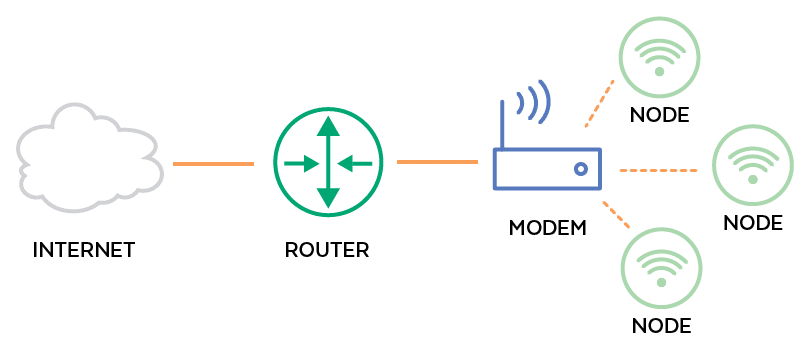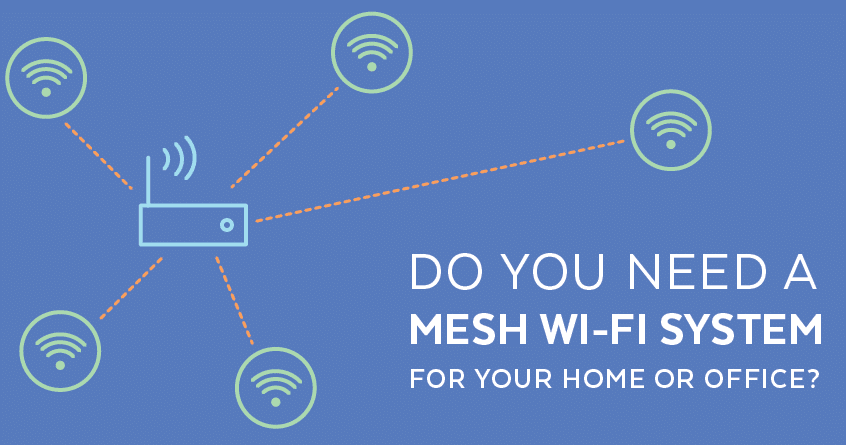Imagine this: You have just spent the morning setting up your home network. You have used all the latest Wi-Fi hardware and you have a 100Mbps connection. Pleased with yourself, you decide to go to your bedroom to relax and stream a movie—then the buffering begins. You call your ISP provider and confirm that everything checks out.
So, what’s the deal?
Chances are you need a mesh Wi-Fi system.
What is mesh Wi-Fi?
A mesh Wi-Fi (also called Whole Home Wi-Fi) system consists of a main router that connects directly to a modem, together with one or more satellite modules (nodes) that are placed strategically around a house (or an office) to blanket it with Wi-Fi. These are all part of a single wireless network and share the same Service Set IDentifier (SSID) and password.
In short, a mesh Wi-Fi system extends a wireless router signal to anywhere within a home or office to ensure internet access.
 Who needs mesh Wi-Fi?
Who needs mesh Wi-Fi?
Mesh Wi-Fi is handy for those who work or live in surroundings that:
- Are larger than 3,000 square feet
- Have unusually shaped floor plans (like Ls)
- Have thick, brick, or metal internal walls
- Have rooms or areas that do not have electrical service
All of the situations listed above (and others) can lead to faulty internet connectivity that interferes with reliable service to computers, tablets, and smartphones.
How does mesh Wi-Fi work?
This technology is pretty straightforward.
A mesh router is different from a traditional Wi-Fi router in that it uses two or more “satellite” routers to deliver wireless coverage. These routers all work together to provide coverage and, as mentioned above, share the same network and SSID.
A mesh router system contains two or more components that act as nodes (the more nodes, the better the coverage). Depending on which router brand is used, one node is assigned the role of the primary router, with all the other nodes acting as satellites—OR—all the routers might be completely interchangeable.
One unit must be plugged into the internet modem or router with either type, while all remaining satellites are placed around the house or office to enable good coverage. The positioning of the satellite routers is essential. They must be put close enough together to communicate but far enough apart to be able to spread the total coverage.
Why should I consider mesh Wi-Fi?
Here are the main advantages of using mesh Wi-Fi:
1. Reliability
Homes and offices are often vulnerable to dead zones where there is not enough (or even no) wireless service for internet-connected devices to work correctly.
Should this condition exist, you can lose your Wi-Fi signal at any time—perhaps in the middle of a download or an app update. Mesh Wi-Fi puts an end to this problem by taking your router’s original wireless signal and rebroadcasting it at its original strength.
Your router’s signal will have a range of about 100 feet. However, the mesh Wi-Fi satellites that you place throughout the space will reproduce the wireless signal to cover the whole area.
It needs to be emphasized that mesh Wi-Fi satellites are not separate networks—they rebroadcast the original Wi-Fi signal, which means they connect to only one network and provide coverage throughout the entire building. And it gets even better because, with mesh Wi-Fi, there is coverage outside the building too.
2. Speed Consistency
With a traditional Wi-Fi router, the Wi-Fi signal weakens as it travels further from the router, and you also lose speed as the signal weakens. If you live in a small house—say, 1,200 square feet—you may not notice anything. However, if your home is larger—like 3,000 square feet—the speed difference between your living room and bedroom could be significant. For example, you may be able to stream Netflix just fine in your living room, but it will not even load in your bedroom. This type of speed variation is frustrating!
This is where mesh Wi-Fi shines. With mesh Wi-Fi satellites strategically positioned throughout the entire house, you will have a solid wireless signal with consistent speed. If you choose, you can put a satellite in every room in your home, but only one or two satellites are necessary for most people.
When it comes to businesses, you will probably want more satellites—maybe even up to a dozen—as you will want a satellite in conference rooms, IT hotspots, and any remote offices in the building.
3. Network Management
Network management consists of things like fixing, improving and maintaining a network. This process usually requires specialized knowledge of and on-demand access to the wireless network. However, many mesh routers have built-in management tools, such as app integration that allows control of all aspects of the network without having to log into a web-based console. You can even use this app to control the network remotely.
4. Security
One of the biggest concerns that users have is: If I boost up my internet service, will strangers be able to use it without my permission?
Because of the networking features mentioned above, along with the manual control you have over your hardware, this almost never happens. In the unlikely event that it does happen, you can change your network settings, kick off every device from your Wi-Fi, change the password, and start again. Because of these types of capabilities, mesh Wi-Fi is one of the most secure wireless networking techniques on the market.
Are there some disadvantages when it comes to mesh Wi-Fi systems?
With every popular technology comes a few disadvantages; this is also true of mesh Wi-Fi. Here are a couple of things to consider:
- Mesh routers are more expensive than traditional single-unit routers. However, into this equation goes the fact that this is a one-time purchase which will last for years.
- You will have to deal with extra hardware. Each satellite will need a place to “live” (e.g., a table or shelf). These devices are not easily hidden from sight.
Conclusion
Mesh Wi-Fi is reliable, fast, secure, and can be managed and maintained easily. While most traditional routers are large, awkward, and have cables to contend with, mesh Wi-Fi satellites have been designed to have a much smaller footprint. They can be left out to blend with your home or office decor. If you are having problems with your wireless coverage, a mesh Wi-Fi system just might be a good solution.

